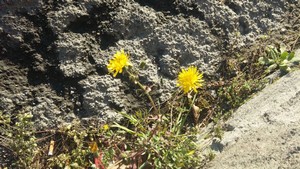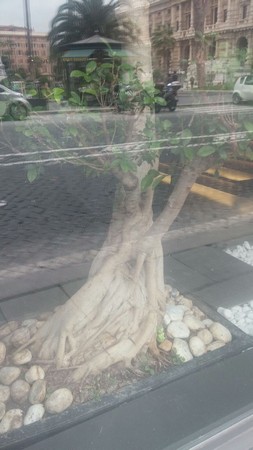The Voices of the Days/2 - The miracle of the tree and the scion: defying death
by Luigino Bruni
published in Avvenire on 06/03/2016
 “Blessed is the man who walks not in the counsel of the wicked …He is like a tree planted by streams of water that yields its fruit in its season, and its leaf does not wither.”
“Blessed is the man who walks not in the counsel of the wicked …He is like a tree planted by streams of water that yields its fruit in its season, and its leaf does not wither.”
Psalm 1
The intelligence of human beings is not the only intelligence of the planet. Next to ours there is also that of the different animals, insects, and even that of the different plants. Botany and other sciences show us that vegetables and plants feel, learn, see, suffer and remember, they decide, help and collaborate with each other, and they are much more similar to us than we would think.
Farmers and gardeners know this well, since they are the ones who see and hear how plants react to the touches of their hands every day, and how their behaviour also responds to a law of reciprocity, among themselves and with us. They live and grow well in our gardens and our homes when they find their genuine companions in us, and they wither because they absorb our nervousness and negativity - the death of a plant next to us is always a message.
We can all experience the richness of the life of plants, but we have to walk into a forest or a park without haste, without headphones, without running, focused on our calories only. We are surrounded by many languages that we do not understand, because one day we started to run too fast, starting the gradual extinction of many non-human languages that had inhabited the earth for thousands of years - it is only by slowing down and taking their pace that we can re-enter the harmony of the "voices" of plants and much other life.
Trees and the world of plants have a dominant fundamental characteristic: they are anchored to the soil, they have roots. This being anchored to the ground has been a great evolutionary disadvantage, because it prevents plants from escaping from predators or moving in times of crisis of the surrounding environment (like fire or climate change). They are there, still and docile in front of us - there is no more radical docility than that of a peach tree or a willow. So, in the course of a few million years, they had to learn to survive even if at the cost of losing 50 or 80% of their body, managing not to die even when they are eaten and reduced to almost nothing. To succeed in this operation, which appears to us as a real miracle, plants perform their vital functions with their entire body.
We animals have had a big evolutionary advantage on the plants because of the development of our organs, in a strong functional division. We breathe with lungs, hear with your ears and see with our eyes. Plants, however, as they have no organs, see, breathe and feel through the full extent of their body. We have a hierarchical system to think and decide, plants "think and decide" with their leaves, with their branches, with their stem and with their roots. Their vulnerability caused by their physical inactivity has led them to spread their vital functions in all their cells. The specialized organs of the animals have allowed for a great efficiency and a huge cognitive success, but we have to pay for it with another great vulnerability: it is enough to lose one vital organ to die. It is much more difficult to kill a plant than an animal. A great vulnerability, therefore, has become a greater resistance to death.
There are many things that the vulnerability and resilience of plants can tell us. The companies of the past centuries have been structured on the animal model: a strong functional division of labour and a hierarchical order. This hierarchical and functional organization has enabled firms to run really fast, to move in search of opportunities, to react to stimuli and the changes of the environment, to become the most successful organism in these decades of great "climate change", especially if compared with civil and political communities that have been much slower, democratic, widely spread and anchored to their territory. Enterprises have been and are the big winners of the evolutionary history of our fast running time. At some point, however, at the turn of the millennia, the environment of the human world went through a dramatic change with the arrival of the Internet and networks – which are actually very similar to plants. The same metaphor of the network or of the web reminds us very closely of the spread of plant life, and certainly not of the organs and animal hierarchies. And those who want to move around in this new environment now have to breathe, listen, remember and talk with their entire body, just like plants. This means that the rigid hierarchical structure has to be reconsidered and overturn. Those who want to survive and grow today in the new economy are increasingly called to evolve by decentralizing and spreading out all functions (including entrepreneurial ones) by giving up a hierarchical control of all processes and decisions and by enabling and empowering every single body cell.
In fact, in our model of development, especially in Europe, we have known and still know companies that are organized according to the plant paradigm: these are the cooperatives. The strength of cooperation is in having developed a distribution of functions throughout the body, by giving up the rigid hierarchical organization to activate the entire corporate structure. Cooperatives have learned to breathe, feel and decide with their whole body, and they have always done it by re-thinking the company's property and direction. As they were anchored to their territories, they have been much slower and generally less efficient than capitalist enterprises, but have proved much more resistant and resilient to environmental crises, whether external or internal. And when they are dead or dying, their failure is often the outcome of having given up the plant metaphor in order to imitate the fastest and most attractive animals, adopting their type of governance and culture. If cooperatives and community businesses lose their ability to use all their cells to live, they will only end up with the disadvantages of being anchored to the ground - and, like a fox caught by poachers snare, they will be infinitely more vulnerable than the tree they find themselves tied to.
It is likely that the protagonists who are able to live through the "era of the spider web" successfully will be more and more diffused and horizontal, and also that they will look very much like the "old" cooperatives. The vulnus (weak point) of business in the new economy of the network is in fact their being changed to fit in terms of culture and governance but not yet in property rights. The owners of the new web shaped giants are still too few, their (huge) profits  are still very concentrated in just a few hands. Ownership and therefore the distribution of wealth will be the challenges of the new plant-like capitalism, issues about which we cannot say hardly anything today, because we continue to think of them along the categories of the twentieth century (entrusting all to policy and / or taxes alone). Until we begin to think of new forms of property spread out in the new forests, we will continue to imitate plants but remain predators.
are still very concentrated in just a few hands. Ownership and therefore the distribution of wealth will be the challenges of the new plant-like capitalism, issues about which we cannot say hardly anything today, because we continue to think of them along the categories of the twentieth century (entrusting all to policy and / or taxes alone). Until we begin to think of new forms of property spread out in the new forests, we will continue to imitate plants but remain predators.
The vulnerable resistance of plants can tell us many more things.
Let’s just think of ideal driven spiritual communities, or our inner life. The communities that have been able to survive the death of their founders, and / or to overcome serious crises, were widespread and able to breathe and see with their whole body. If the leaders or founders become the heart or the head of their community, with their death the whole community dies. If their charisma is spread through the entire body, communities are able to continue to live not only after their founder dies, but even after losing much of their body.
Finally, even the good development of the inner spiritual life can be seen as a progressive transformation of the soul, which becomes more and more like a tree. If our inner life is structured according to the animal paradigm, always on the move and without roots, we become extremely vulnerable when our vital places – people, work and certainties – are struck. Being betrayed by a friend, the death of a spouse, retirement or a crisis of faith is enough to sink into nothingness, and experience an instance of authentic spiritual death. Good education, especially of young people, therefore, consists in learning to feel, suffer, love, talk and see with all our soul. It takes longer, but it takes us much farther and higher, and we can survive losing 50, 90 or even 99% of our "body", and still be able to regenerate from a little "remnant" that's still alive in some corner. To get out alive from moments of great crisis, whether moral or physical, it can be enough to have a little bit of living tissue saved and healthy, that did not get devoured by predators – and rise again. Many times this "something living" is simply our job: we return to the office destroyed by misfortune, devoured by grief, abandonment, persecution, and while we turn on the PC or roll up the usual shutter, suddenly we can feel physically that life is starting again and it is starting to revive gradually, throughout our body. God spoke to Moses from the burning bush as he was tending the flock of his father-in-law, that is, while he was working. Work was often the place of the greatest theophanies. We have saved ourselves from authentic deaths of our soul so many times because we still knew how to make lunch, or because for years we continued to set the table with the same care as if there was someone who saw it and felt loved because of it. Or because we were able to recite the only prayer that still we remembered. And so a beautiful scion was born, and sometimes even a big tree with many fruits.
download pdf article in pdf (118 KB)






